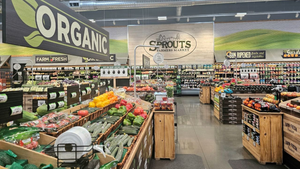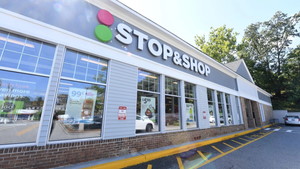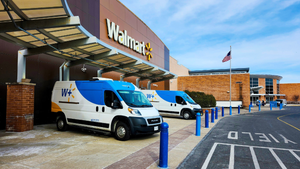6 food safety topics retailers, restaurant leaders discussed at Ecolab symposium6 food safety topics retailers, restaurant leaders discussed at Ecolab symposium
Including how to track regulations, leverage tech, get higher-ups’ invested and more

Food safety leaders from grocery stores and restaurants gathered last week to discuss concerns, challenges and solutions for food safety standards at Nation’s Restaurant News’ Food Safety Symposium sponsored by and held at the Ecolab research and development center in Eagan, Minnesota.
Ecolab provides water, hygiene and energy products and services to help its customers maintain clean and safe environments. Ecolab's services and solutions are used by businesses in the foodservice, hospitality, healthcare, food processing and industrial markets.
At the symposium, along with education on food safety and sustainability, Ecolab showed attendees its innovations that help businesses with best health practices. For example, Ecolab offers a service where businesses can send samples of material that they are considering installing, such as flooring or material for furniture, as well as samples of dishes and cooking utensils. Ecolab will test these materials and provide information about what exactly it is made of. It can also test for durability and recommend the best cleaning products.
The symposium’s education sessions and attendee discussions also dove into problem-solving strategies for food safety standards. Take a look at what topics retailers talked about.
Tracking Regulations
Tracking legislation can be difficult because there is a constant stream of information from regulators, leaders said. It’s most difficult to track local legislation, a bit easier to keep tabs on state legislation and easiest to remain in-the-know about federal legislation, according to retailers and restaurant leaders at the symposium.
One way to get ahead of this challenge, retailers said, is leveraging suppliers and communicating goals to help with different laws, sustainability and packaging.
Another solution that retailers recommended was finding a network of information to keep in touch with, whether it’s newsletters, conferences, joining a coalition and leveraging academia.
Organizations that leaders at the symposium utilize include the National Restaurant Association and Ecolab. In addition, the Conference for Food Protection provides education on new regulations that are coming out or that may be passing. Another educational conference is the National Environmental Health Association (NEHA) Annual Educational Conference and Exhibition.
Dig into academia, attendees said, and contact the author of a research project. A lot of the time, authors are happy to talk about their articles.
Leveraging Technology
Retailers brought up the idea of using technology to onboard and train employees in food safety standards. Gamification and bite-sized training can make it more fun for employees to enjoy and retain training, like the way they absorb social media today.
Offering employees rewards, such as gift cards, for completing training was another idea. Training could also be more role-specific, leaders said, so employees aren’t inundated with information that doesn’t pertain to them.
Predictive tech would help stores get ahead of pest outbreaks, low soap and paper towel levels or a device not functioning properly. Ecolab is developing a new soap dispenser that has a blinking light when soap is running low. That way, a retailer knows exactly when to order more product, and it keeps them from guessing the best timing and wasting product. This would also improve the guest experience.
Making Data Actionable
While there’s a lot of data available, retailers struggle with driving decisions to make it actionable, especially in food safety. It’s manual and time consuming, they said.
Retailers want to receive data from vendors and from within their organizations that’s summarized and simplified, with specific recommendations on what to do with it.
Speaking a Different Language
Often, corporate executives aren’t as invested in food safety as they should be, retailers said. Sometimes, it's seen as an area of operations that should only be addressed when something goes wrong. Food safety leaders disagree, though, and want their higher-ups’ support and investment in the department.
It might just be a matter of “speaking a different language,” said a restaurant leader at the symposium. While the culture of the company is often based on what the higher-ups find important, like profits, phrasing food safety needs in terms of how it will benefit the business is an efficient approach.
Another way to get more of the organization on board and interested in the importance of food safety is having a mission statement written by the CEO. Having management’s buy-in gets everyone else on board, they said.
Store-Specific Standards
Many retailers have multiple types of store formats, including combinations of delis, hot food stations, bakeries and more. A checklist of food safety standards is not going to be the same across all locations, however, retailers found it challenging that food safety data doesn't differentiate between various store formats.
Concerns About Salmonella
The U.S. Department of Agriculture's (USDA) Food Safety and Inspection Service (FSIS) has declared that raw breaded stuffed chicken products containing Salmonella at levels of one colony forming unit (CFU) per gram or higher are adulterated, according to the USDA.
This means that it is illegal to sell these products if they are contaminated with the pathogen.
Retailers agreed that along with at store-level, the full supply chain is responsible for managing this.
They were comfortable with the standard operating procedures involved, though, and have addressed critical control points in documenting this.
When building out new locations stores, make sure that employees are trained on these precautions and aren’t cutting corners, they said. Consider focusing more on legal impact than on store operations with employees.
This story was originally featured on CSP Daily News, a sister publication of Supermarket News.
About the Author
You May Also Like


.webp?width=300&auto=webp&quality=80&disable=upscale)



